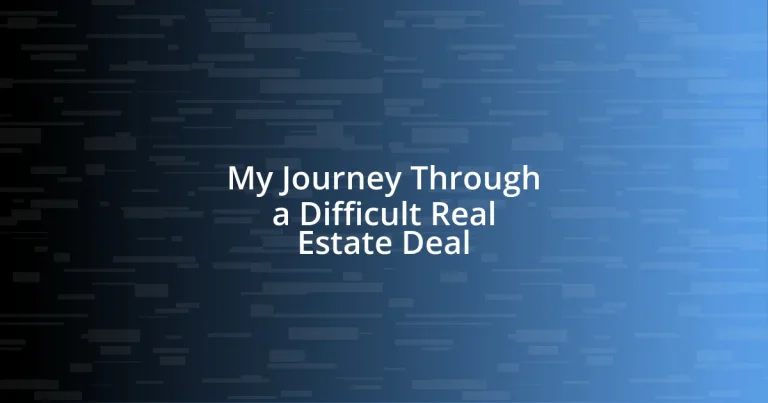Key takeaways:
- Understanding market dynamics and breaking down data help in making informed real estate decisions.
- Identifying challenges early, such as financing issues and inspection surprises, enhances adaptability and strategic planning.
- Learning from setbacks and sharing lessons with peers fosters personal growth and improves future dealings in real estate.

Understanding the Real Estate Market
Understanding the real estate market is like trying to decode a complex puzzle. From my experience, I’ve learned that market conditions can shift almost unexpectedly. One minute, you feel confident in a buyer’s market, and the next, the tables have turned, leaving you wondering if you should act fast or hold your ground.
I distinctly remember a time when I was scouting for a property during a noticeable upswing. It was exciting but also nerve-wracking; prices were rising, and I kept asking myself, “Am I getting in too late?” That moment of uncertainty really pushed me to dig deeper into my research. I started tracking comparable sales in the neighborhood, and it felt like uncovering hidden treasures.
Navigating this landscape requires a keen sense of timing and a sharp eye for trends. Have you ever felt overwhelmed by all the data? I certainly have! Yet, I’ve found that breaking down the statistics—like average days on the market or price per square foot—into bite-sized pieces makes it much easier to digest. Understanding these elements can empower you to make informed decisions, and trust me, that feels incredibly satisfying.

Identifying Potential Challenges
Identifying potential challenges in a real estate deal often feels like peering through a foggy window. You can see outlines of obstacles but navigating the details requires clarity. Throughout my journey, I’ve encountered challenges that initially seemed insurmountable but became manageable once I identified them clearly.
Here are some of the common challenges I’ve faced:
– Financing Issues: Securing a loan can be more difficult than expected; unexpected documentation requests often arise.
– Inspection Surprises: During one deal, I was blindsided by costly repairs that weren’t disclosed upfront.
– Negotiation Stalemates: I found myself stuck when both parties dug in their heels; understanding motivations helped break the deadlock.
– Market Fluctuations: Prices fluctuated wildly in my early experiences, making it crucial to stay informed about local conditions.
Recognizing these challenges early on allowed me to develop strategies. It’s like preparing for a storm: anticipating the wind helps you find solid ground. Each experience taught me the importance of remaining adaptable and resourceful, turning potential turmoil into valuable lessons.
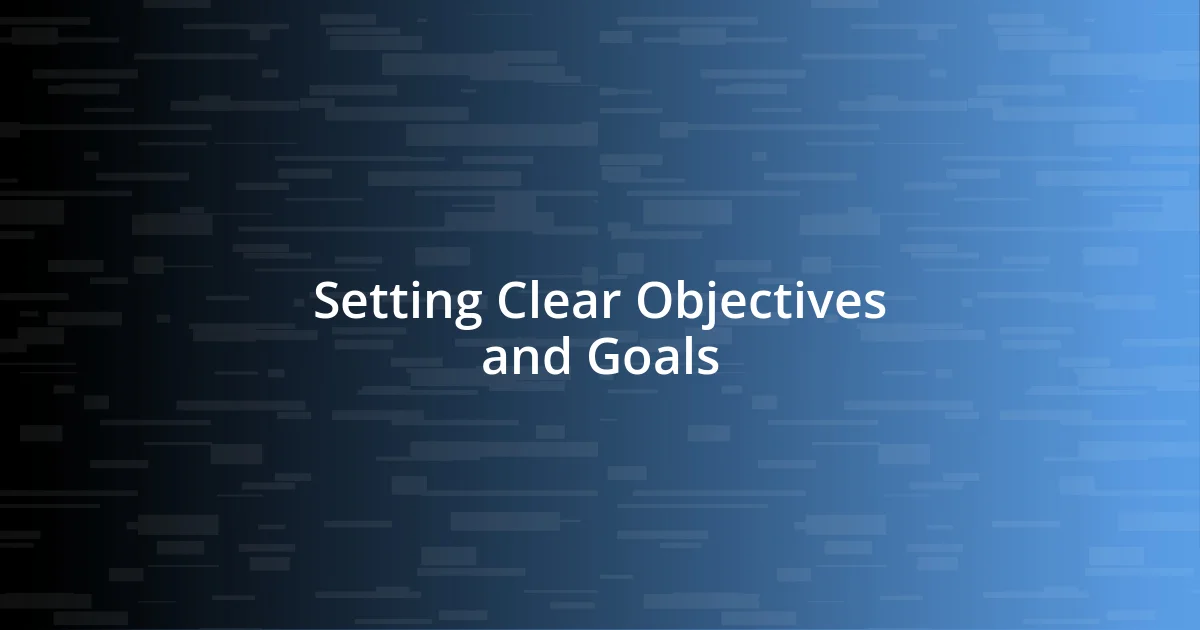
Setting Clear Objectives and Goals
Setting clear objectives and goals is foundational in navigating the complexities of a real estate deal. I’ve learned that specific, measurable goals not only provide you with direction but also keep your motivation high, especially during challenging times. For instance, during one deal, I set a clear objective to acquire a property within a certain budget and timeframe. This clarity helped me filter out many distractions and focus on what truly mattered, even when the process got tough.
In another instance, I remember feeling overwhelmed when multiple properties popped onto the market. My instinct was to jump at every opportunity, but I took a step back and reiterated my specific goals. This shift in mindset empowered me to prioritize properties that aligned with my vision instead of chasing after fleeting options. Have you ever felt that frantic urge to seize every opportunity? I know I have! However, that moment of clarity made me realize the significance of holding firm to my objectives.
Additionally, having clear objectives allows you to communicate effectively with others involved, such as agents or investors. I recall sharing my goals with my real estate agent, which strengthened our collaboration. It ensured we were both on the same page from the start, ultimately streamlining the negotiation process. When everyone knows the endgame, it’s easier to overcome hurdles together.
| Objective | Outcome |
|---|---|
| Acquiring within budget | Focused decision-making |
| Prioritize aligned properties | Avoided distractions |
| Clear communication | Smoother negotiations |
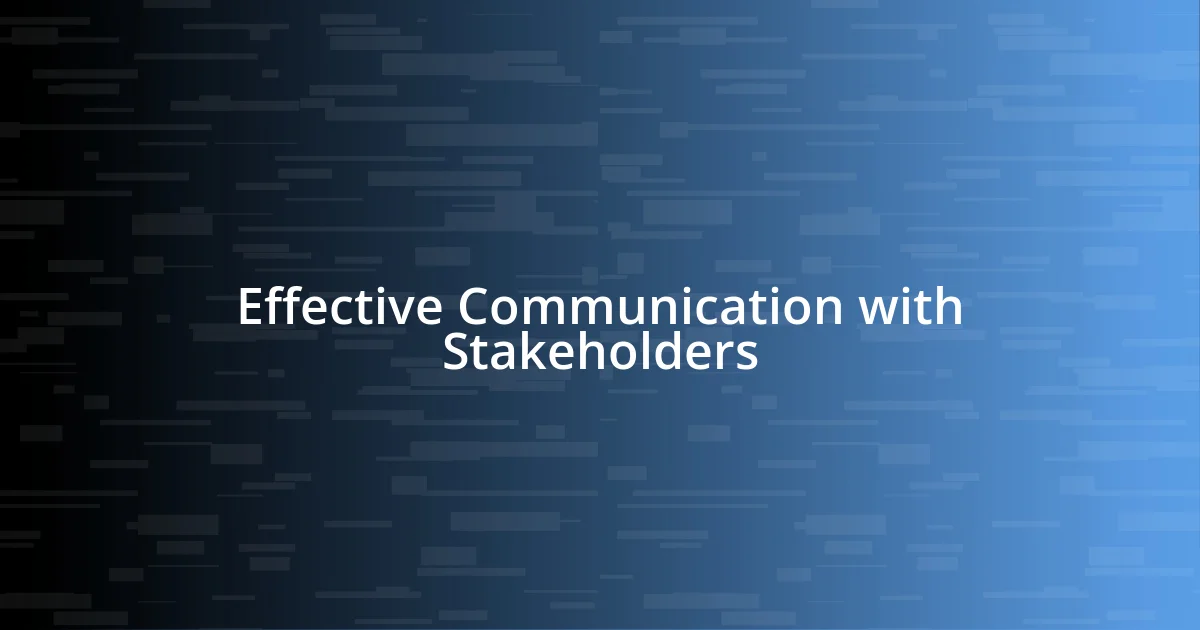
Effective Communication with Stakeholders
Effective communication with stakeholders can arguably make or break a real estate deal. I vividly remember a moment when I misread the expectations of my lender. Early on, I assumed I was aligned with their requirements, only to discover later that we had different interpretations of “risk tolerance.” It made me realize just how crucial it is to ensure everyone is not only informed but also genuinely on the same page.
In another instance, I learned the hard way about the importance of timely updates. I was working with a seller who had a tight deadline, and I underestimated the impact of not keeping them in the loop. When I finally reached out, their frustration was palpable. It struck me how essential proactive communication is—it’s about more than just sharing information; it’s about building trust and rapport.
Have you ever felt the tension that arises from misunderstandings? I certainly have, especially when it comes to negotiations. I once faced a situation where my buyer was hesitant, and the atmosphere became charged. By initiating an open dialogue, I asked them about their concerns, which helped to dispel some of the tension. This led to a productive discussion that ultimately uncovered mutual interests. Effective communication isn’t just a skill; it’s an art that can turn obstacles into opportunities for collaboration.
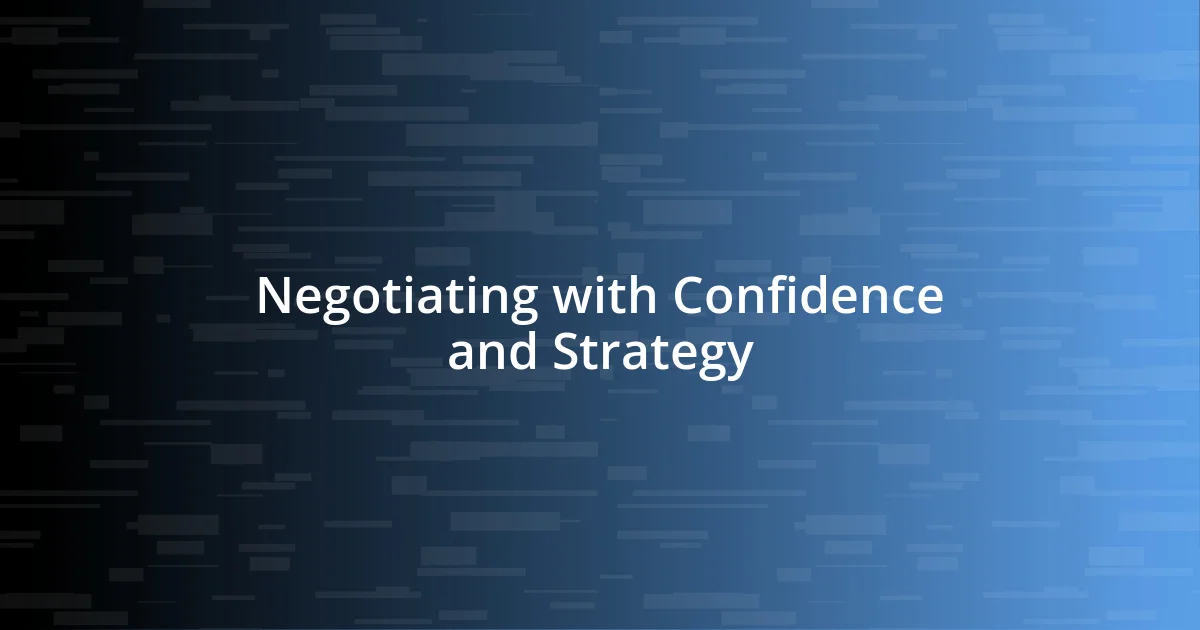
Negotiating with Confidence and Strategy
Negotiating in real estate requires more than just knowing the market; it’s about communicating with confidence. I remember a particular deal where the seller was reluctant to budge on the price. Instead of feeling defeated, I took the time to prepare my arguments, focusing on the property’s condition and comparable sales. This strategy not only bolstered my confidence but also shifted the dynamics of our discussion. Have you ever entered a negotiation feeling uncertain? I have, and I’ve learned that presenting a well-researched case can transform that anxiety into assuredness.
Employing strategic negotiation techniques is equally critical. During one negotiation, I utilized a technique called active listening, which means truly hearing what the other party was saying. This allowed me to uncover their underlying motivations, which I cleverly used to my advantage. It’s fascinating how what seems like a simple conversation can reveal so much; I was able to suggest alternatives that met their needs without straying from my goals. How often do you think about the other party’s desires in a negotiation? I bet it’s more impactful than you realize.
Ultimately, maintaining a calm demeanor during discussions plays a crucial role. I recall a high-pressure negotiation where tensions ran deep, and both sides were frustrated. Instead of escalating the situation, I took a deep breath and reminded myself to focus on solutions rather than problems. I remember saying, “Let’s step back and find a win-win here.” That simple shift in my approach not only eased the tension but opened the door to collaboration. Negotiating with confidence means not only knowing your worth but also leading with empathy. How do you keep your cool when stakes are high? For me, grounding myself in the collaborative spirit of negotiation has made all the difference.
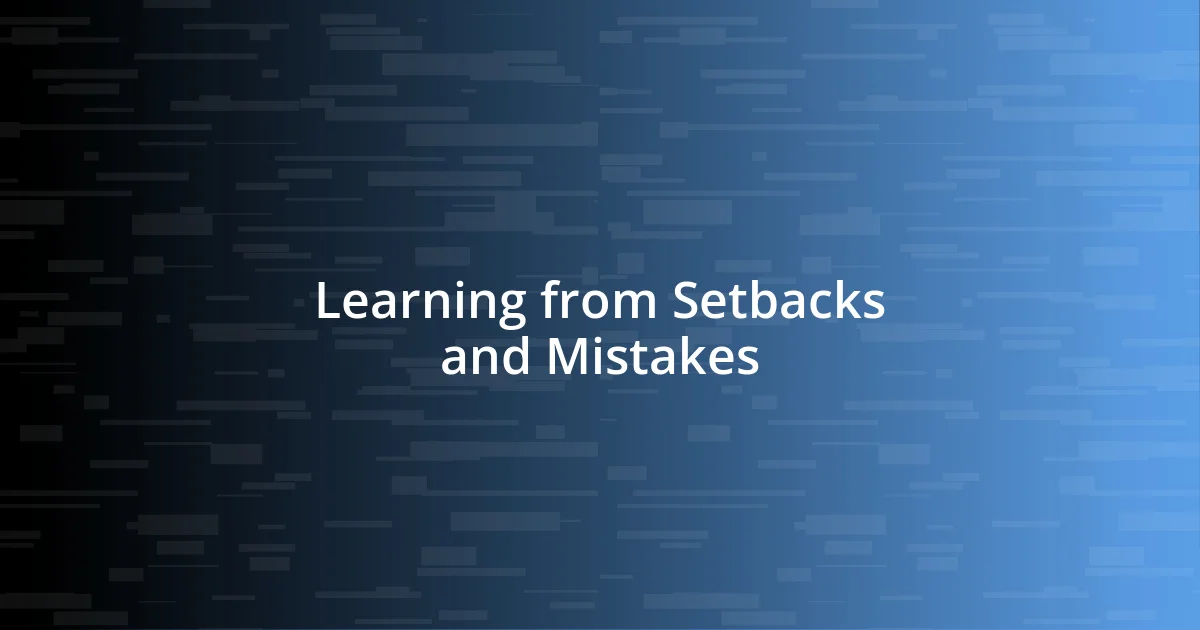
Learning from Setbacks and Mistakes
Facing setbacks in real estate deals has been an invaluable teacher for me. I once miscalculated renovation costs on a property, assuming a quick flip would yield profits. The reality hit me hard when the expenses ballooned, leading to a loss. This experience underscored the importance of thorough research and diligent budgeting. Have you ever underestimated a project thinking it would be straightforward? I learned to treat every detail with care, because even small oversights can snowball.
One of my biggest takeaways has been the value of resilience. After a particularly tough deal fell through, I found myself questioning my abilities. The vulnerability was difficult to face, but in retrospect, it pushed me to refine my approach. I sought feedback from peers and mentors, turning perceived failures into constructive learning opportunities. Isn’t it interesting how setbacks can reshape our perspective? I came to appreciate that every experience, even the painful ones, carries a lesson if we choose to see it.
Addressing mistakes head-on has become a part of my growth journey. There was a time when I hesitated to acknowledge a misstep with a client, thinking it might harm our relationship. However, when I finally confessed, I was surprised by their understanding and support. Their reaction taught me that honesty fosters trust. Isn’t it refreshing to realize that vulnerability can actually strengthen connections? Embracing mistakes, rather than shying away from them, has turned my setbacks into stepping stones.

Applying Lessons to Future Deals
After navigating a particularly tricky real estate deal, I realized the importance of integrating the lessons learned into future transactions. I remember reflecting on how my initial reactions influenced the outcome; during one negotiation, I was impatient and too eager to seal the deal. Looking back, I can see that taking a step back and assessing my priorities could have altered the trajectory of that deal. Have you ever rushed into something, only to later wish you’d taken a more measured approach?
Now, I make it a point to create a checklist of key takeaways after each deal. This helps me stay grounded and ensures I don’t repeat past mistakes. For instance, I jot down specific tactics that worked well and those that didn’t quite hit the mark. Just recently, I revisited a checklist from a deal where communication stumbled. Recognizing what went wrong allowed me to prioritize clarity in future interactions. Isn’t it amazing how a simple list can remind us of our journey and serve as a guide to navigate the complex landscape of real estate?
I also found that sharing these lessons with peers not only reinforces my understanding but fosters a sense of community. A friend and I often exchange stories about our toughest deals; it’s eye-opening to hear how others tackle similar challenges. During one of these discussions, I discovered that his approach to building relationships before negotiations mirrored my own newfound strategy. What we both realized is that building a network based on trust and honesty can lead to smoother transactions. Don’t you think that learning from each other is one of the best ways to grow?












